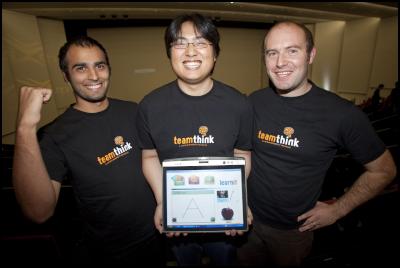Microsoft Announces Imagine Cup New Zealand Winner
Microsoft Announces Imagine Cup New Zealand Winner
Team Think from Lincoln University to represent New Zealand at worldwide finals in Egypt

AUCKLAND, New Zealand - 30 April, 2009 - A team of students from Lincoln University has won the national finals of the 2009 Microsoft Imagine Cup, and will represent New Zealand at the worldwide Imagine Cup finals in Cairo, Egypt this July.
The Imagine Cup, now in its third year in New Zealand, is the world's premier student technology competition. More than 250,000 students from 100 countries entered this year-a record level of participation. As a theme, Microsoft called on young programmers, artists and designers to use technology to solve the world's most pressing challenges.
Team Think addressed this challenge in their winning entry by aiming to improve education through a simple tablet and PC interface. They identified that learning reading and writing requires practice through verbal communication and hand gestures. To this end, they devised a program for tablets that provides both handwriting recognition and audio output, eliminating the need for basic literacy to understand lessons or instructions. They hope to take this prototype to developing countries that have underutilised computers due to literacy issues.
A field of 88 teams from around New Zealand entered the Imagine Cup, narrowed through regional competitions judged in conjunction with strategic partner organisations Intergen, Provoke, NextSpace, New Zealand Computing Society TechNZ and Fronde. The national winner was chosen from six presenting teams by a panel of judges at the national finals last night at the University of Auckland Business School. Team Think will now have the chance to win the USD$25,000 cash grand prize awarded at the worldwide competition.
"The answers to today's problems lie in the minds of tomorrow's leaders," said Kevin Ackhurst, country manager, Microsoft New Zealand. "The solution put forward by Team Think is a perfect example. Based on what I've seen of the ideas demonstrated throughout the competition, the future has never been in more capable hands," said Ackhurst.
One of the eight finals judges, Women in Technology Director Carol Lee Andersen, has been selected from an international pool of nominees as a judge for the Imagine Cup's worldwide finals, and will join Team Think in Cairo. She said she was pleasantly surprised at the quality of the New Zealand finalists.
"I've been impressed and inspired by the level of creativity and innovation demonstrated in this competition. The future of technology in this country is bright. Team Think will do New Zealand proud at worldwide finals," she said.
Michael Trengrove, team leader for Team Think, said "It's been a wild ride, from coming up with our project, to building it and testing-not to mention the added pressure of presenting. But now we're here as winners and excited for the next round. Bring on Cairo."
Team Think was composed of Trengrove, Graham Smart and Chun Ling Wong, all of Lincoln University,
Second place went to Team Ahurei from AUT University for their fire notification system based on mobile phones. Using sensors remotely deployed around a defined area, signals are sent to a central software program based on changes in temperature. The program processes the signals and sends an early detection warning to the appropriate agencies via mobile and software channels. The team envisions this system deployed in bushfire prone regions around the world.
In third place was Team Biometritec from the University of Auckland, who created an embedded mobile phone technology which tracks, connects, and reunites families and communities separated by catastrophes. Their concept gathers personal information through a mobile device, which is then transferred to a central server, manipulated and checked for resemblances to other individuals. Notifications are then sent of potential matches.
ends


 Raise Communications: NZ Careers Expo Kicks Off National Tour Amid Record Unemployment
Raise Communications: NZ Careers Expo Kicks Off National Tour Amid Record Unemployment Hugh Grant: How To Build Confidence In The Data You Collect
Hugh Grant: How To Build Confidence In The Data You Collect Tourism Industry Aotearoa: TRENZ 2026 Set To Rediscover Auckland As It Farewells Rotorua - The Birthplace Of Tourism
Tourism Industry Aotearoa: TRENZ 2026 Set To Rediscover Auckland As It Farewells Rotorua - The Birthplace Of Tourism NIWA: Students Representing New Zealand At The ‘Olympics Of Science Fairs’ Forging Pathway For International Recognition
NIWA: Students Representing New Zealand At The ‘Olympics Of Science Fairs’ Forging Pathway For International Recognition Coalition to End Big Dairy: Activists Protest NZ National Dairy Industry Awards Again
Coalition to End Big Dairy: Activists Protest NZ National Dairy Industry Awards Again Infoblox: Dancing With Scammers - The Telegram Tango Investigation
Infoblox: Dancing With Scammers - The Telegram Tango Investigation